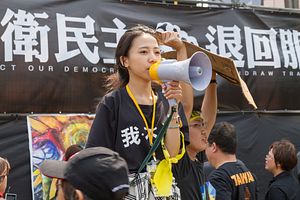Confronted with multiple sources of insecurity – the U.S. rebalancing toward Asia, Japan’s expanding self-defense definition, and the ongoing democracy demonstrations in Hong Kong – Chinese President Xi Jinping bolstered Beijing’s resolve toward Taiwan by espousing a “one country, two systems” proposal for unification in a speech in late September. Xi’s rhetoric not only revealed China’s anxiety about relations with Taiwan in an uncertain strategic environment, it also came at a time of weakening cross-strait relations. With Taiwan’s delay in ratifying the Cross-Strait Service Trade Agreement (CSSTA) and the outbreak of the student-led Sunflower Movement in March, cross-strait relations have stumbled on a lack of trust and momentum. In these circumstances, pushing Taiwan hard for an immediate political dialogue is not feasible. Instead, China is pursuing a low-pressure approach that seeks to expand contacts with people from all sectors in Taiwan, with the aim of winning hearts and minds.
Losing Momentum
Since he took office in 2008, President Ma Ying-jeou of Taiwan has sought to promote cross-strait exchanges and maintain the status quo through a policy of “no unification, no independence and no use of force,” as described in a speech on October 22. This approach has “prompted Taipei and Beijing to sign 21 agreements and reach two points of consensus… Cross-strait relations are at their best level in 65 years.”
However, this warming atmosphere cooled after Taiwan’s Sunflower Movement, in which students occupied the Legislative Yuan for a month in opposition to any trade deals with Beijing without official oversight established in Taiwan. The delay in the CSSTA has tested China’s patience, and relations have begun to lose momentum. Certainly, any potential Ma-Xi meeting is officially dead in the water; Taipei sent Vice President Vincent Siew to attend the leaders’ summit of the Asia-Pacific Economic Cooperation (APEC) forum last week.
This lack of momentum reflects a loss of trust, traditionally a rare commodity in China-Taiwan relations. Take a recent report in China’s Global Times, which accused Taiwanese intelligence operatives of recruiting Chinese exchange students in Taiwan to spy on China. Although not directly addressing the details of the accusations, China’s Taiwan Affairs Office said, “The instigations of Taiwan’s spying and intelligence organs seriously harms the safety and healthy growth of young students and is a serious interference in cooperative education exchanges across the strait,” requesting Taiwan “immediately stop such activities.” In response, the Taiwan National Security Bureau denied the accusations and blasted China’s Communist Party for restricting speech and freedom of movement, and specifically the requirement that Chinese students report to Chinese authorities when they return from studying in Taiwan.
Of course, relations are hardly at crisis point. Given the polarization of Taiwan’s politics, the heightened “Taiwanese identity,” and the uncertain outcome of the upcoming presidential election in 2016, China knows that Taiwan has no domestic space to discuss high-sensitivity issues, especially in a cross-strait political dialogue. And so Beijing is opting for a low-pressure policy, refocusing on fostering people-to-people interactions. Starting in June, when its chief of Taiwan affairs Zhang Zhijun visited Taiwan, Beijing’s approach has focused on “grassroots communication.” During his visit, Zhang sought to expand interactions with people from all sectors, including members from the pro-independence Democratic Progressive Party (DPP) and locals in southern Taiwan, traditionally a DPP stronghold, and urged “more cross-Straits communication especially, among ordinary citizens.”
Echoing China’s policy, Taiwan recently agreed to increase the number of regular non-stop flights across the Taiwan Strait from 828 to 840 per week, and is also slated to remove the visa requirement for Chinese visitors to Taiwan’s two outlying islands, Kinmen and Matsu, beginning in 2015. Significantly, two respective speeches delivered by Ma and Xi in the past two months indicated a refocus on the “people” in Taiwan. In a speech in October, Ma indicated that the government would continue advancing cross-strait ties across all areas, “always putting the interests of Taiwan and its people first.” While Xi did champion a “one country, two systems” call for unification, in the same speech he further stressed that this policy would “take the island’s actual condition into consideration,” and “fully consider Taiwanese interests.”
Winning Hearts and Minds
China’s low-pressure tactics should help decrease the tensions that have dogged ties since the Sunflower Movement in March. However, whether its people-centered approach can reverse negative impressions about China in Taiwan is another question. Early indications are not promising. A public opinion survey published in August 2014 noted that up to 58 percent of all respondents in Taiwan were unhappy with China’s cross-strait policy. A similar percentage (59 percent) were dissatisfied with Taiwan’s ruling party, the Kuomintang. Still, the news is not all grim: compared to last year’s survey, the number of respondents answering “I don’t know (about the policy)” in the survey rose – which perhaps suggests that while winning Taiwanese hearts and minds won’t be an easy task for China, in may not be an impossible one.
Emily S Chen is a graduate student in the Center for East Asian Studies at Stanford University with a focus on international relations.

































